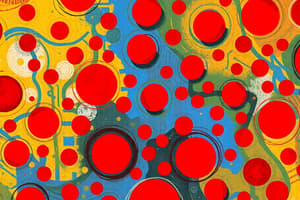Podcast
Questions and Answers
What is the primary mechanism of action of Atovaquone?
What is the primary mechanism of action of Atovaquone?
- Inhibits protein synthesis
- Stimulates cell apoptosis
- Blocks DNA replication
- Inhibits mitochondrial electron transport (correct)
Which side effect is associated with Atovaquone?
Which side effect is associated with Atovaquone?
- Dizziness
- Nausea
- Headache (correct)
- Rash
What effect does Atovaquone have on ATP?
What effect does Atovaquone have on ATP?
- Inhibits ATP release
- Disrupts ATP production (correct)
- Enhances ATP utilization
- Increases ATP production
In addition to headache, which unusual effect can Atovaquone cause?
In addition to headache, which unusual effect can Atovaquone cause?
What type of medication is Atovaquone classified as?
What type of medication is Atovaquone classified as?
Which condition is primarily treated using combination therapies?
Which condition is primarily treated using combination therapies?
What condition involves a higher than normal level of methemoglobin in the blood?
What condition involves a higher than normal level of methemoglobin in the blood?
Which of the following is NOT treated by combination therapies?
Which of the following is NOT treated by combination therapies?
What is one of the clinical symptoms associated with leishmaniasis?
What is one of the clinical symptoms associated with leishmaniasis?
What is a primary characteristic of hemolytic anemia?
What is a primary characteristic of hemolytic anemia?
Which of the following therapies is most commonly associated with treating leprosy?
Which of the following therapies is most commonly associated with treating leprosy?
Which of the following is NOT a common symptom linked to leishmaniasis?
Which of the following is NOT a common symptom linked to leishmaniasis?
Leishmaniasis can present with which of the following symptoms?
Leishmaniasis can present with which of the following symptoms?
In the context of leishmaniasis, what do arthralgias typically refer to?
In the context of leishmaniasis, what do arthralgias typically refer to?
Which of the following pairs correctly identifies symptoms associated with leishmaniasis?
Which of the following pairs correctly identifies symptoms associated with leishmaniasis?
What is a common adverse effect associated with high doses of drugs used for Pneumocytosis and Toxoplasmosis?
What is a common adverse effect associated with high doses of drugs used for Pneumocytosis and Toxoplasmosis?
What type of activity do the combination drugs for Toxoplasmosis exhibit?
What type of activity do the combination drugs for Toxoplasmosis exhibit?
Which of the following symptoms might indicate neurologic toxicity from these drugs?
Which of the following symptoms might indicate neurologic toxicity from these drugs?
Which of the following is NOT typically a concern when using drugs for Pneumocytosis and Toxoplasmosis?
Which of the following is NOT typically a concern when using drugs for Pneumocytosis and Toxoplasmosis?
What is glossitis in the context of drug side effects?
What is glossitis in the context of drug side effects?
What type of substance is indicated as a drug of choice for African sleeping sickness?
What type of substance is indicated as a drug of choice for African sleeping sickness?
For which disease is the organic arsenical specifically mentioned as the drug of choice?
For which disease is the organic arsenical specifically mentioned as the drug of choice?
Which of the following is NOT a characteristic of the drug mentioned for African sleeping sickness?
Which of the following is NOT a characteristic of the drug mentioned for African sleeping sickness?
What category of drugs does the substance used for African sleeping sickness belong to?
What category of drugs does the substance used for African sleeping sickness belong to?
In the context provided, which of the following is true regarding the treatment of African sleeping sickness?
In the context provided, which of the following is true regarding the treatment of African sleeping sickness?
Flashcards are hidden until you start studying
Study Notes
Combination Therapies
- Combination therapies can enhance efficacy through synergistic activity, particularly against parasites like Toxoplasma gondii.
Hemolytic Anemia
- Certain drugs can lead to hemolytic anemia as an adverse effect due to their impact on red blood cells.
Leprosy Treatment
- Specific pharmacological regimens are utilized for treating leprosy, a chronic infectious disease.
Methemoglobinemia
- Methemoglobinemia can occur with certain drug use, impacting the blood's ability to carry oxygen.
Atovaquone
- Atovaquone inhibits mitochondrial electron transport, disrupting ATP production essential for cellular energy.
C/U (Clinical Use)
- Atovaquone is effective as a treatment for pneumocystosis and toxoplasmosis infections.
- High doses of Atovaquone can lead to various adverse effects.
AE/Toxicities (Adverse Effects/Toxicities)
- Common side effects include headache, abnormal dreams, gastric irritation, glossitis, and neurologic symptoms such as insomnia, tremors, seizures, arthralgias, and rash.
Drug for Leishmaniasis
- Certain drugs exhibit toxicities that may include neurologic symptoms and skin reactions, particularly at high doses.
Treatment for African Sleeping Sickness
- An organic arsenical drug is the preferred therapeutic choice for African sleeping sickness, which is crucial in treating this severe parasitic infection.
Studying That Suits You
Use AI to generate personalized quizzes and flashcards to suit your learning preferences.




